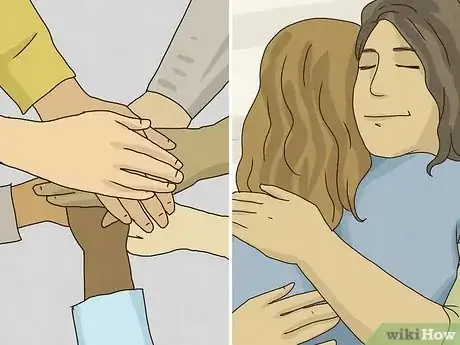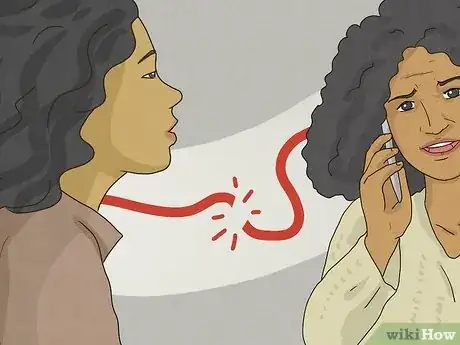This article was written by Jay Reid, LPCC and by wikiHow staff writer, Glenn Carreau. Jay Reid is a Licensed Professional Clinical Counselor (LPCC) in private practice in San Francisco, CA. He specializes in helping clients who have survived a narcissistic parent or partner. Treatment focuses upon helping clients identify and challenge self-diminishing beliefs as a result of narcissistic abuse. Jay holds a BA in Psychology from the University of Pennsylvania and an MS in Clinical Psychology from Penn State University.
This article has been viewed 7,235 times.
Dealing with narcissistic personality disorder (NPD) is a challenge, especially within your family—but rest assured, it can be done. It's normal to feel an obligation to your family, but remember to care for yourself first and foremost. Narcissistic people lack empathy and demand validation from everyone around them, making them damaging to your mental health. We've put together a comprehensive guide to recognizing NPD and a list of practices to help you deal with the narcissistic relative in your life.
This article is based on an interview with our licensed professional clinical counselor, Jay Reid. Check out the full interview here.
Steps
Short-Term Solutions for Dealing with Narcissistic Family
-
1Stay calm and reason with the narcissist rather than fighting. It’s natural to get frustrated by their negativity, but a narcissist's obsessive need to be right makes it hard to resolve things by arguing. Give them a compliment before offering constructive feedback, and finish by expressing confidence in their ability to change. Let them know that your relationship will improve if they do.
- Remind yourself that the conflict results from the narcissist's personality and are not really about you, so you don't need to fight back or defend yourself.
- Don't call them a narcissist outright, either. You might be trying to make them stop and think about their actions, but they'll likely just try to prove that you're the problem, not them.
-
2Remind yourself that you both have choices. When your family member starts complaining to you, let them know that they can choose to let go of their perceived issues and direct that energy elsewhere. Similarly, you can find support and purpose outside of the narcissistic relative if they take a toll on you.[6] You're not obligated to stick around!
- Realizing that you have a choice is often empowering enough to help you relax in stressful encounters.
- Rather than engaging with your family member's negativity, try saying, "I can see that you're frustrated. Have you considered focusing your energy somewhere else? You're always free to choose your own path."
-
3Set boundaries with that family member. Because they're prone to such intense manipulation, people with NPD don't have a sense of boundaries. Put reasonable limitations on your interactions with them for your own mental health. It falls to you to decide what you will and won't do for them and how much time you're willing to invest in them.[7]
- If they demand too much attention with frequent text messages, put your phone down without replying.
- Let them know that you won't participate in negative conversations where they're rude to you or talk about other family members behind their back.
-
4Remove yourself from toxic interactions. Be prepared for your narcissistic family member to disregard your boundaries initially.[8] If they do, show them that you won't accept their bad behavior by excusing yourself and leaving. You don't have to cut contact right away; just make it clear that your limits need to be respected.
- You could say, "Hey, I'm going to get some air. I feel uncomfortable talking about our cousin like that, so let's try talking later once we clear our heads."
- Stick to your guns, and don't let them make you feel guilty. Your boundaries are clearly defined, so you're not overreacting by getting the space you need.
-
5Treat yourself with love and compassion. Narcissists are normally quite negative, and interactions with them can make self-love even more of a challenge. Take care of your physical, mental, and emotional needs. You're worthy of kindness, so choose to love yourself unconditionally regardless of what the narcissist says to tear you down.[9]
- If your family member insults you, keep track of the facts. Do they have any evidence for their claims? Or are they just expressing an exaggerated opinion?
- Practice self-care by exercising, eating well, calming your mind with peaceful, enjoyable activities, and getting plenty of sleep.[10]
Long-Term Solutions for Dealing with Narcissistic Family
-
1Built a support network, both inside and outside of the family. Spend time with friends and other family members who make you feel happy and good about yourself. Rely on them to give you unconditional love, and seek their advice or encouragement when dealing with the narcissist.
- Trusted friends are especially helpful because they're removed from the situation and can offer a more objective perspective.
- A family member you trust can back you up and offer moral support during face-to-face interactions with the narcissist.
-
2Limit future interactions with them. Decide in advance how often you want to see this family member and communicate with them over the phone. Ensure that you only spend time with them when you're comfortable and have agreed to do so. Reiterate your boundaries to them in advance, so they understand your expectations.[11]
- If they live close by, you could resolve to only see them once a week for a quick lunch. Alternatively, you might decide you only want to see them when other people are present at family events.
- Set time limits for phone calls so you won't have to listen to their negativity and complaints for too long.
-
3Keep a journal and record your interactions with them. A journal will help you set the record straight when your narcissistic family member tries to lie or gaslight you.Write in the journal regularly. Then, go back and read your previous entries when the narcissist tries to accuse you of something or belittle you, and remind yourself of what really happened.
- Write the date with each entry. Gaslighting is based on vague generalizations; you can refute the accusations when you have solid facts, dates, and times on your side.
-
4Cut the narcissist from your life if necessary. If your narcissistic family member can't or won't respect your boundaries despite all your efforts, consider cutting ties with them entirely. It isn't an easy decision, but remember that your well-being comes first. You're not a bad relative for distancing yourself from a toxic person.[12]
- Make a plan before you cut ties. Discuss it with friends if you need a second opinion, and make sure you can safely cut the narcissist off.
-
5Seek support from a therapist. A therapist can be an essential part of your support network if you have the means to see one. They can examine your situation with fresh and professional eyes and offer insightful advice for coping with a narcissistic family member. They can also coach you through an exit plan if you need one.
- If you’re not sure how to find a therapist, start by asking your primary care physician for a referral.
- If you have health insurance, you can check your plan’s provider directory online.
- You can also search for a therapist using a helpful database like Psychology Today.
References
- ↑ https://www.mayoclinic.org/diseases-conditions/narcissistic-personality-disorder/symptoms-causes/syc-20366662
- ↑ https://www.mayoclinic.org/diseases-conditions/narcissistic-personality-disorder/symptoms-causes/syc-20366662
- ↑ https://www.helpguide.org/articles/mental-disorders/narcissistic-personality-disorder.htm
- ↑ https://www.mayoclinic.org/diseases-conditions/narcissistic-personality-disorder/symptoms-causes/syc-20366662
- ↑ https://ajp.psychiatryonline.org/doi/10.1176/appi.ajp.2014.14060723
- ↑ https://www.helpguide.org/articles/mental-disorders/narcissistic-personality-disorder.htm
- ↑ https://www.helpguide.org/articles/mental-disorders/narcissistic-personality-disorder.htm
- ↑ https://www.helpguide.org/articles/mental-disorders/narcissistic-personality-disorder.htm
- ↑ https://www.self.com/story/how-to-love-yourself













































































Medical Disclaimer
The content of this article is not intended to be a substitute for professional medical advice, examination, diagnosis, or treatment. You should always contact your doctor or other qualified healthcare professional before starting, changing, or stopping any kind of health treatment.
Read More...